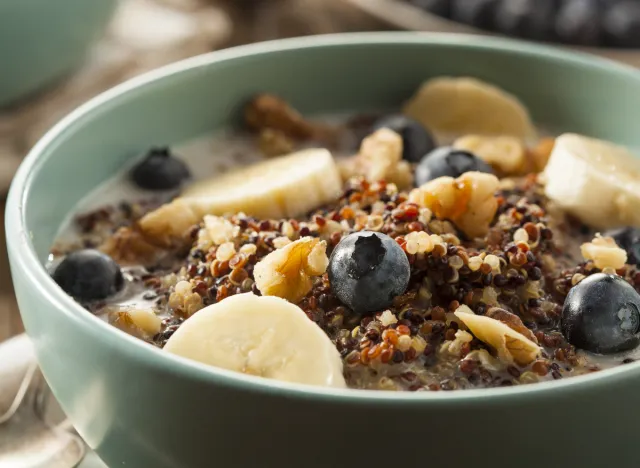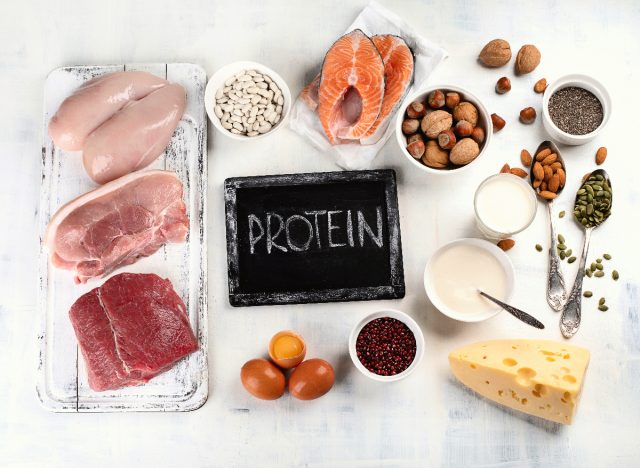8 Surprising Habits That Are Draining Your Energy

Whether it's hitting a dreaded afternoon slump or feeling totally sluggish at the end of the day, many of us have been there before. When your energy is totally zapped, you feel like curling up under a pile of blankets, vegging out, and canceling any plans. You may also wonder what made you feel this way in the first place. We spoke with Amy Goodson, MS, RD, CSSD, LD, a registered dietitian and certified specialist in sports dietetics who sits on our Medical Expert Board, who shares some surprising habits that drain your energy.
You need energy to power through the day and function to the best of your ability. Therefore, nixing any habits that may cause you to feel fatigued is imperative. "To maintain high energy levels, focus on a balanced diet, regular exercise, and healthy sleep patterns," Goodson tells us. "Additionally, stay hydrated, limit your sugar and caffeine intake, and consider consulting with a healthcare professional for personalized advice on optimizing your energy levels."
If you're curious about the surprising habits that drain your energy, keep reading to learn more. And when you're finished, don't miss out on the 10 Things You Should Do Every Morning for All-Day Energy.
Skipping breakfast

Okay, we get it: You're always on the run, and sometimes breakfast gets put on the back burner or thrown right out the window. But don't make the mistake of skipping this important meal of the day.
"Many people skip breakfast, thinking it will help them lose weight or save time," Goodson says. "However, skipping breakfast can lead to low blood sugar levels and decreased energy throughout the day. It can even lead people to crave sugar later in the day to help get their energy levels up."
Not drinking enough water

Don't underestimate the importance of staying sufficiently hydrated. There's a good reason why your body needs plenty of water each day. "Even mild dehydration can make you feel tired and sluggish, and even cause you to have a headache," explains Goodson. "Make sure you're drinking enough water throughout the day to stay properly hydrated. A good rule of thumb is to take your weight in pounds, divide it by two, and drink that many ounces. Then add five to 10 ounces for every 20 minutes of exercise."
Consuming too much sugar

There are so many sneaky ways to consume a lot more sugar than you're aware of. For instance, certain foods such as pasta sauce, yogurt, granola bars, instant oatmeal, and energy drinks can be filled with sugar.
"Consuming too much sugar can lead to energy spikes and crashes," Goodson tells us. "It can also contribute to weight gain and insulin resistance, which can leave you feeling tired. While you might feel good in the moment, you are sure to feel drained shortly after."
Being overly dependent on caffeine

Caffeine can be an amazing boost to get you going first thing in the morning and for a great afternoon pick-me-up. But be careful not to overdo it or become too dependent on your daily cups of joe.
"While caffeine can provide a temporary energy boost, relying on it too heavily can lead to a cycle of dependency and ultimately disrupt your natural energy levels," Goodson cautions. "Plus, it can cause headaches and make you feel jittery. What's worse is coming off a caffeine crash can make you feel worse than you did before you drank it to begin with."
Not eating enough protein

If you're dieting, it's common to limit meals to salads, vegetables, and smoothies. While those are great additions to any healthy diet, it's important to have a well-rounded group of foods, including the right amount of protein to provide your body with the energy it needs.
"Protein is essential for maintaining muscle mass and providing a steady source of energy," Goodson explains. "Protein helps you get full faster and stay full longer, so if you omit protein from your plate, you are likely to experience blood sugar highs and lows, which result in energy highs and lows. Not getting enough protein in your diet can leave you feeling fatigued in the hours following a meal."
Not getting solid sleep

Not getting enough restful sleep can wreak havoc on your health. But for some, winding down at the end of a long day can be a challenge. It's essential to find the source of your problem if you aren't achieving consistent sleep patterns.
"Consistently getting insufficient or poor-quality sleep can have a major impact on your energy levels," Goodson points out. "Aim for seven to nine hours of quality sleep per night."
RELATED: 5 Best Mediterranean Lifestyle Tips for a Longer, Healthier Life
Leading a sedentary lifestyle

Did you know that not getting enough physical activity can make you feel less energetic? According to Goodson, "Regular physical activity helps improve circulation and oxygen flow, which can boost your energy. While you may not feel like exercising in the moment, it can help your energy levels later in the day."
Overeating or undereating

These are two opposite ends of the spectrum, and both of them can be detrimental when it comes to affecting your energy levels. "Overeating can lead to sluggishness, while undereating can deprive your body of essential nutrients and energy, leaving you feeling tired on a regular basis," Goodson says.









